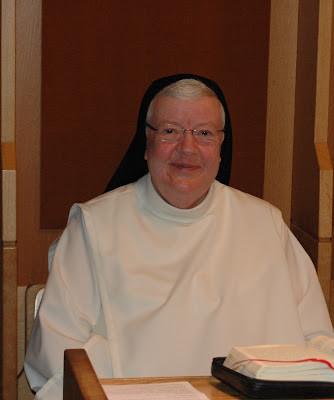A festival is a sign of heaven. It symbolises our deepest aspiration
- an experience of total communion.
(Jean Vanier, Community and Growth, London: Darton, Longman, and Todd, 2nd revised edition, 1989)

Like the month of May, August is for us a time with many feasts and celebrations. Already at the end of July, we celebrate Saint Olav, patron of Norway, and then follows the Transfiguration, Saint Dominic and the Assumption of the Blessed Virgin Mary, just to mention a few of the liturgical highlights.
The Church celebrates a Jubilee of Mercy this year, the Dominican Order celebrates 800 years... and here at Lunden we have the reputation to have received a special charism of celebration...
This does not mean that life is one long party - that we are always having a ball, as it were. On the contrary. There is room both for feasting and fasting. That is exactly why we need celebrations. We need festival to remind ourselves that light has in fact conquered darkness, life is indeed stronger than death, love more powerful than hate and violence. We need to keep alive our faith in and hope of the eternal banquet. Celebrations remind us that we already enjoy the first fruits of the harvest that is to come, the fulfillment for which all creation groans in labour pains (cf. Rom. 8:22 - 23), just as the people of Israel could celebrate Passover and eat of the produce of the Promised Land even before they had conquered it (cf. Jos. 5:10 - 11).
Celebrating events means to commemorate God's goodness towards us, deepening and strengthening our sense of the meaning of these events in our lives.
Celebrating each other is and expression of love: lifting each other up and show that we value one another.
At other times we are troubled by profound questions. Can we celebrate at all when we know that so many people live in acute poverty, are driven from their homes, are abused and oppressed... when we see how the world is full of powers actively opposing precisely such "an experience of total communion"?

True celebration is something more than superficial excesses or flight from reality. It is a sign and anticipation of Heaven. In this perspective, true celebration is sacramental in character. It is not for nothing that we use the verb celebrate when speaking of the Sacraments. Rolheiser writes: "Occasionally we do succeed and we genuinely celebrate: we join others and feel ourselves being widened and made larger, in community, in playfulness, in love."
Sometimes we can, for one reason or another, find it difficult to join fully in the celebration.
At times we discover that we stand like the older brother of the prodigal son, bitter and resentful outside the house, refusing to enter into the joy of the party because we are unable to be reconciled, unable to accept the good given to others - or because we are unable to receive the good give to us: "My son, you are here with me always; everything I have is yours..." (Luke 15:31).
Ronald Rolheiser OMI claims in his book Prayer: our deepest longing that "[t]he main reason we find it so difficult to truly celebrate is that we lack the capacity to genuinely enjoy, to simply take life, pleasure, and love as a gift from God pure and simple." (Cincinnati: Fransiscan Media, 2013).
At other times we are troubled by profound questions. Can we celebrate at all when we know that so many people live in acute poverty, are driven from their homes, are abused and oppressed... when we see how the world is full of powers actively opposing precisely such "an experience of total communion"?
Brother Roger, the founder of the community in Taizé answered such a question from a young person already almost 50 years ago:
But in our thirst for more justice, should we renounce the intimate festival offered to each Christian? There would be nothing left for us, then, but to bow our necks under the yoke of our despair and offer all of humanity our tristesse.
Does living this festival hinder us from entering the struggle for justice?On the contrary. Festival does not mean a fleeting euphoria. It is animated by Christ Himself in men and women fully conscious of the situation of the world and capable of taking on the most serious of events. But these men and women know themselves to be inhabited by the very same drive for power and oppression that is the origin of war and injustice. They know the battle begins in themselves, lest they should find themselves, even without knowing it, among the oppressors. Thus the struggle itself becomes festival: festival of the battle to ensure that Christ is our first love, festival of the struggle for the downtrodden.
(Que ta fête soit sans fin (Festival without end), Taizé: Les Presses de Taizé, 1972; our own translation from the French)

True celebration is something more than superficial excesses or flight from reality. It is a sign and anticipation of Heaven. In this perspective, true celebration is sacramental in character. It is not for nothing that we use the verb celebrate when speaking of the Sacraments. Rolheiser writes: "Occasionally we do succeed and we genuinely celebrate: we join others and feel ourselves being widened and made larger, in community, in playfulness, in love."
It can be simple joys and modes means, but festivals of this kind open us to the good, the true and the beautiful, and keep the flame of hope alive in this time of waiting and pilgrimage.
The kingdom of heaven may be compared to a king who gave a feast for his son’s wedding. He sent his servants to call those who had been invited […] "I have my banquet all prepared, my oxen and fattened cattle have been slaughtered, everything is ready. Come to the wedding!"
(Matt. 22:2-4)





